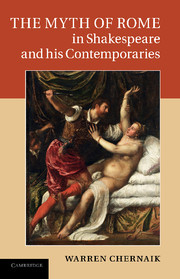Book contents
- Frontmatter
- Contents
- Acknowledgements
- Introduction: a Roman thought
- 1 Roman historians and the myth of Rome
- 2 The wronged Lucretia and the early republic
- 3 Self-inflicted wounds
- 4 ‘Like a Colossus’: Julius Caesar
- 5 Ben Jonson's Rome
- 6 O'erflowing the measure: Antony and Cleopatra
- 7 The city and the battlefield: Coriolanus
- 8 Tyranny and empire
- 9 Ancient Britons and Romans
- Postscript: Shakespeare and the republican tradition
- Notes
- Bibliography
- Index
2 - The wronged Lucretia and the early republic
Published online by Cambridge University Press: 29 March 2011
- Frontmatter
- Contents
- Acknowledgements
- Introduction: a Roman thought
- 1 Roman historians and the myth of Rome
- 2 The wronged Lucretia and the early republic
- 3 Self-inflicted wounds
- 4 ‘Like a Colossus’: Julius Caesar
- 5 Ben Jonson's Rome
- 6 O'erflowing the measure: Antony and Cleopatra
- 7 The city and the battlefield: Coriolanus
- 8 Tyranny and empire
- 9 Ancient Britons and Romans
- Postscript: Shakespeare and the republican tradition
- Notes
- Bibliography
- Index
Summary
SHAKESPEARE AND LIVY
A striking anomaly in Shakespeare's narrative poem Lucrece (1594) is that the prose Argument attached to the poem does not accurately represent the poem itself. The Argument closely follows Shakespeare's two main sources, Livy's Ab Urbe Condita, Book I, and Ovid's Fasti.
Lucius Tarquinius (for his excessive pride surnamed Superbus) after he had caused his own father-in-law Servius Tullius to be cruelly murdered, and, contrary to the Roman laws and customs not requiring or staying for the people's suffrages, had possessed himself of the kingdom, went accompanied with his sons and other noblemen of Rome to besiege Ardea; during which siege the principal men of the army meeting one evening at the tent of Sextus Tarquinius, the king's son, in their discourses after supper everyone commended the virtues of his own wife. Among whom Collatinus extolled the incomparable chastity of his wife Lucretia. In that pleasant humour they all posted to Rome, and intending by their secret and sudden arrival to make trial of that which everyone had before avouched, only Collatinus finds his wife (though it were late in the night) spinning amongst her maids. The other ladies were all found dancing and revelling, or in several disports. Whereupon the noblemen yielded Collatinus the victory, and his wife the fame. At that time Sextus Tarquinius, being inflamed with Lucrece' beauty, yet smothering his passions for the present, departed with the rest back to the camp. From whence he shortly after privily withdrew himself, and was (according to his estate) royally entertained and lodged by Lucrece at Collatium. […]
- Type
- Chapter
- Information
- The Myth of Rome in Shakespeare and his Contemporaries , pp. 35 - 55Publisher: Cambridge University PressPrint publication year: 2011



